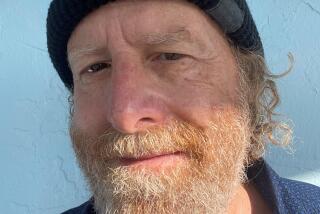‘Unincorporated Persons in the Late Honda Dynasty’ by Tony Hoagland
- Share via
Unincorporated Persons in the Late Honda
Dynasty
Poems
Tony Hoagland
Graywolf: 100 pp., $15 paper
Despite being a poet, Tony Hoagland has maintained an unprejudiced relationship with language. With the same casual delivery as his contemporaries, Dean Young and David Berman, he walks the line between the high poetic and the mass-media idiom, seemingly unaware that the line even exists. His poetry expresses itself not just as a significant art, but as the best kind of entertainment.
Like his last collection “What Narcissism Means to Me,” Hoagland’s new book “Unincorporated Persons in the Late Honda Dynasty” is propelled by the voice of its self-aware narrator, lost in Wal-Mart, mulling over the tropes of pop culture. In different poems, he analyzes the slang of the moment -- “get real”, “I be at the crib” -- and discusses “the precise moment when ‘going all the way’ turned into ‘getting it on.’ ” When bored, he thinks about dialectical materialism at the supermarket.
In this way, his poetry contains good sturdy handholds for all readers. His broad humor can guide even the most inexperienced reader through the rush of his many ah-ha epiphanies. His phrases have a satisfying crunch and his ideas unravel in a digressive thread that’s pleasing just to watch move across the page. Where much poetry demands a previously nurtured sensitivity to language, Hoagland shows us what we already know about the advertisement words that swarm among us every day.
“I feel that we are so drowned in a culture whose media forces and spin-doctoring are so powerful, so pervasive, and so hard to ignore,” Hoagland said in a recent interview with the Academy of American Poets, “that poetry is actually well-equipped to present a model of what our experience is like right now.”
In “Unincorporated Persons” he listens to an accordion rendition of “It’s a Hard Rain’s A-Gonna Fall” at the Springdale Shopping Mall and realizes “there’s nothing we can’t turn into a soft-drink flavor or a t-shirt.”
His characters work as corn chip engineers and their “favorite sport is shopping.” It all seems so tongue-in-cheek, but in spite of all the smart-aleck humor Hoagland packs into every one of his poems, his viewpoint rarely feels dismissive.
He is a Buddhist and though he is skeptical, he is also unafraid of being sappy or unabashedly honest about the inflated ego that nags at him every day. He never allows his negative, discursive mind to stomp out the spot-on observation of a man floating through a mad world. “Confucius said this would happen,” he writes, “that language would be hijacked and twisted/by a couple of tricksters from the Business Department.”
At times, this social commentary lingers, his elbow-nudging gets sore -- he calls Britney Spears “my adorable little monkey” -- but even at his most subversive he never stops making the reader actively smile, and he always pushes against the boundaries of our most quotidian language. However dubious he is about the monster of American capitalism, he also feels a deep intimacy with it, knowing it to be the father of the words from which Hoagland, the poet, was born. “When you said you would leave me / to my own devices,” he writes, “what did you mean? Did you mean this?”
Simonini is interviews editor at the Believer.
More to Read
The biggest entertainment stories
Get our big stories about Hollywood, film, television, music, arts, culture and more right in your inbox as soon as they publish.
You may occasionally receive promotional content from the Los Angeles Times.









